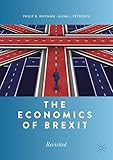The Economics of Brexit [electronic resource] : Revisited / by Philip B. Whyman, Alina I. Petrescu.
Material type: TextPublisher: Cham : Springer International Publishing : Imprint: Palgrave Macmillan, 2020Edition: 1st ed. 2020Description: XXXV, 390 p. 71 illus., 69 illus. in color. online resourceContent type: text Media type: computer Carrier type: online resourceISBN: 9783030559489Subject(s): Economics | Political economy | Macroeconomics | European Economic Community literature | Public finance | Law and economics | Popular Science in Economics | International Political Economy | Macroeconomics/Monetary Economics//Financial Economics | European Integration | Public Economics | Law and EconomicsAdditional physical formats: Printed edition:: No title; Printed edition:: No titleDDC classification: 330 LOC classification: HB71K140-165Online resources: Click here to access online
TextPublisher: Cham : Springer International Publishing : Imprint: Palgrave Macmillan, 2020Edition: 1st ed. 2020Description: XXXV, 390 p. 71 illus., 69 illus. in color. online resourceContent type: text Media type: computer Carrier type: online resourceISBN: 9783030559489Subject(s): Economics | Political economy | Macroeconomics | European Economic Community literature | Public finance | Law and economics | Popular Science in Economics | International Political Economy | Macroeconomics/Monetary Economics//Financial Economics | European Integration | Public Economics | Law and EconomicsAdditional physical formats: Printed edition:: No title; Printed edition:: No titleDDC classification: 330 LOC classification: HB71K140-165Online resources: Click here to access online Chapter One. The Elusive Economic Consensus over Brexit -- Chapter Two. The Fiscal Impact of Brexit -- Chapter Three. Brexit and Trade -- Chapter Four. Foreign Direct Investment -- Chapter Five. Regulation -- Chapter Six. Migration and the Labour Force -- Chapter Seven. Economic Growth and Productivity -- Chapter Eight. Economic Policy Considerations -- Chapter Nine. Alternative Trading Models After Brexit.
The Economics of Brexit – Revisited builds upon and extends the analysis contained within the authors' previous book, The Economics of Brexit: A Cost-Benefit Analysis of the UK's Economic Relationship with the EU, which arguably represented the most comprehensive and systematic evaluation of the UK’s economic relationship with the EU. The Economics of Brexit – Revisited continues where the previous volume left off, given that the UK has now formally withdrawn from the EU, and therefore the focus of the evidence presented concerns the potential economic implications arising from Brexit and considering the options available to those negotiating the UK's future economic relationship both regionally and globally. The Economics of Brexit – Revisited seeks to provide greater clarity to a range of issues that have been hotly debated over the past few years, ranging from the trade and fiscal implications of Brexit, to the economic impact of regulation and migration. The significance of different Brexit options are discussed in detail, including the significance of demands for regulatory harmonisation (the 'level playing field'), along with their implications for UK trade with the EU and the rest of the world. A wide range of economic analyses are evaluated to determine their relative methodological strengths and weaknesses, and ultimately whether their conclusions are sufficiently robust to engender confidence. Finally, noting that a key determinant of the effectiveness of any post-Brexit economic strategy depends upon the degree of flexibility created for economic policy, the book provides an extended examination of the potential relating to different economic policy options available to the UK government, depending upon the form of final trade settlement that is agreed with the EU. These policy options include more active forms of macroeconomic management, combined with industrial and procurement policy. The Economics of Brexit – Revisited therefore seeks to combine evaluation of the available evidence indicating the economic impact of Brexit, together with consideration of policy trade-offs that lie at the heart of the choices surrounding Brexit, and how these might be resolved. The Economics of Brexit – Revisited therefore maintains its position as the most comprehensive analysis of the economics of Brexit in the market today.
